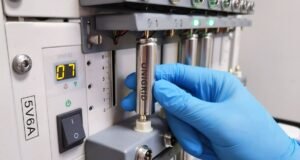Releaf, a Nigerian agritech startup providing ingredients (starting with oil palm) to consumer goods manufacturers and their food factories, raised $3.3 million in an oversubscribed pre-Series A round.
The Jack Ma Foundation-backed startup announced a $4.2 million seed raise in September 2021, including a $1.5 million grant, to launch two new technologies: Kraken II and SITE.
Releaf is revolutionizing the $3 billion oil palm market, which is sustained by 4 million smallholder farmers. Eighty percent of the crop’s production relies on manual labor with rocks or inefficient hardware, yielding low-quality vegetable oil. To address this issue, Releaf has created Kraken: a static palm nut de-sheller machine designed to produce “high-quality” vegetable oil more efficiently for these farmers. By setting up smaller factories near smallholders, Releaf allows them to benefit from better processing yields and lower logistics costs.
“Our seed round was about proving that we could take smallholder palm nuts of low quality and turn them into high-quality oil with Kraken,” Ayogu, co-founder and CTO, told TechGround in an interview.
We successfully proved the concept and over the last few months made great strides in making Kraken more portable, cost-effective (Kraken II) and adding new products (SITE) to our existing suite of technology.
Kraken II is a mobile, less expensive version of the palm nut de-sheller that costs half as much and reduces margin-eroding costs by 80%. Meanwhile, SITE is a geospatial mapping app developed with Stanford University’s Professor David Lobell – MacArthur Fellow and Director of the Center on Food Security and the Environment – to identify oil palm trees in Nigeria.
Ayogu of YC-backed Releaf found that tech alone wasn’t enough to maximize margins for farmers and manufacturers. Kraken’s portability plus SITE’s placement/route planning capabilities solved this, allowing Releaf (Uyo) to target the best opportunities across Nigeria’s oil palm belt, instead of being limited to crops within 100km from a fixed processor like other food processors.
Ayogu, co-founder of Releaf with CEO Ikenna Nzewi, highlighted the main benefit of Kraken and SITE for farmers: reduced logistics costs that allow more profit to be passed back to them while improving end product quality. This technology can eliminate up to 80% of their logistics costs.
In Nigeria’s food processing industry, Releaf is uniquely positioned upstream with less competition and better technology. They offer farmers competitive prices and provide working capital for added market share, according to Ayogu. Downstream competition remains strong from middlemen and traders who typically have more pricing power due to their proximity to consumers.

is a company that has created software to help people manage their medications.
Releaf’s SITE software helps users keep track of medication schedules and dosages, ensuring they stay on top of their health needs.
Since its launch in 2021, Kraken’s supply chain technology has processed over 10 million kg of palm nuts, resulting in a 7x year-on-year growth of monthly revenue. Securing $100 million in contracts from consumer goods manufacturers bolstered Releaf’s valuation to triple its seed round and the agritech plans to expand processing regions and crop types.
“Our research indicates that supply limitations are the key factor restricting downstream performance,” the CTO stated. “Therefore, we’re aiming to take advantage of first mover opportunities with our tech to capture a large share of this fragmented market and grow our margins as well as strengthen our position.”
Samurai Incubate Africa, who led Releaf’s seed round, re-invested in the pre-Series A funding with Consonance Investment Managers. Stephen Pagliuca (Bain Capital Chairman) and Jeff Ubben (WWF Board member & Inclusive Capital Partners Founder) also participated. Rena Yoneyama of Samurai Incubate Africa commented: “Releaf’s pilot Kraken success proves their theory; we’re happy to help them realize their goal of creating efficient African ag supply chains.”








